Mormon 'manifest destiny'
Stephen Stone, RenewAmerica President
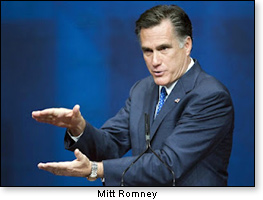 One of the curious things about Mitt Romney's 2012 presidential bid is the near-unanimous support he enjoys among fellow Mormons.
One of the curious things about Mitt Romney's 2012 presidential bid is the near-unanimous support he enjoys among fellow Mormons.
He won the Nevada, Idaho, Arizona, Wyoming, and Hawaii primaries in large part because Mormons form influential voting blocs in those states.
Among Mormons in Utah — headquarters of the LDS church — he's expected to draw somewhere near 90 percent of the Mormon vote in Utah's June primary, as he did earlier in neighboring Nevada and Arizona.
Mormons have been the core base of Mitt's campaign from the outset, backing him not just with their enthusiastic votes, but their activism — as avid donors, volunteers, grassroots organizers, and online defenders. It's a rare Mormon who doesn't want to see Mitt elected president.
A different story elsewhere
As might be expected, Mitt's unabashed support among Mormons contrasts sharply with grudging support for him outside Mormon population centers.
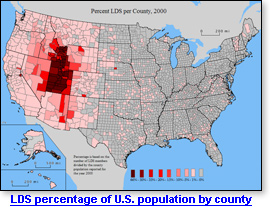 Beyond Mormon-dominated regions (see graphic), Mitt's backers are known to be lukewarm — voting for Mitt almost solely because they believe unsupportable claims "he has the best chance of beating Obama." Impressed that he's been out in front from the beginning this election cycle — largely the result of his establishment connections — they're swayed by his big money advantage, savvy professional organization, and aggressive campaign strategy, which has centered in successful attack ads against opponents, a tactic controversial among grassroots conservatives.
Beyond Mormon-dominated regions (see graphic), Mitt's backers are known to be lukewarm — voting for Mitt almost solely because they believe unsupportable claims "he has the best chance of beating Obama." Impressed that he's been out in front from the beginning this election cycle — largely the result of his establishment connections — they're swayed by his big money advantage, savvy professional organization, and aggressive campaign strategy, which has centered in successful attack ads against opponents, a tactic controversial among grassroots conservatives.
Seemingly oblivious to the fact that Mitt's appeal tends to be regional; that he's barely eked out wins over chief competitor Rick Santorum in "test states" like Michigan and Ohio after vastly outspending him; that he's lost by landslides in many Republican states; and that many of his wins have been in Democrat states not likely to go Republican in the fall, Mitt's reluctant supporters have nonetheless feigned enthusiasm and given him a nod.
NewsMax.com founder Chris Ruddy, noting such facts, writes,
As a "cultural Mormon," Mitt thus has much in common with other LDS members, the vast majority of whom, we might add, are Republican. But that doesn't explain why — in the diverse world of politics — he enjoys almost unanimous support within Mormon culture.
Why such seemingly-reflexive support, as though backing Mitt were a "given" among U.S. Mormons?
Is anybody home?
We might be tempted to chalk up Mormons' virtually universal support for Mitt to "cultural pride" — the idea that "he's one of us, so of course we support him."
That would help explain the natural inclination of Mormons to go for Mitt, but not the extent of that inclination, which runs far and deep. Chances are (believe me, I've encountered it repeatedly), if you speak critically of Mitt with Mormon acquaintances, you're likely to get a highly emotional (if uninformed) rebuke.
The deeply-held passion for Mitt appears to outweigh objective analysis within the culture.
So much so that Mormons are willing to set aside Mitt's immense negatives and defend him single-mindedly in the face of legitimate questions and concerns. Among Mitt's negatives that could be cited are the following facts that trouble moral conservatives:
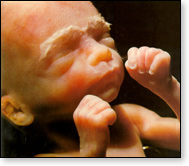 Mitt's pro-choice history. For years, Mitt defied official LDS church teachings and policy and issued unequivocal statements in the political arena defending "a woman's right to choose abortion."
Mitt's pro-choice history. For years, Mitt defied official LDS church teachings and policy and issued unequivocal statements in the political arena defending "a woman's right to choose abortion."
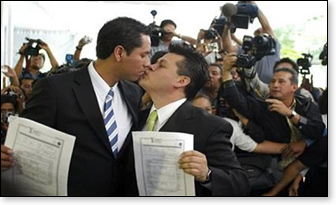 Mitt's hand in establishing same-sex marriage in Massachusetts. Unbeknownst to most Americans outside evangelical circles (thanks largely to suppression of the story by the liberal media), Mitt single-handedly instituted same-sex marriage in Massachusetts when he was governor.
Mitt's hand in establishing same-sex marriage in Massachusetts. Unbeknownst to most Americans outside evangelical circles (thanks largely to suppression of the story by the liberal media), Mitt single-handedly instituted same-sex marriage in Massachusetts when he was governor.
That's no typo — or exaggeration. The public record proves this shocking claim to be indisputable, setting Mitt directly at odds with the LDS church's well-publicized activism in behalf of Proposition 8 in California a few years afterward.
According to one report,
 But Mitt has maintained throughout the 2012 election that he never personally endorsed the so-called "individual mandate" that is the heart of Romneycare for use at the national level. Although he has said the intrusive mandate was a natural fit for liberal states like Massachusetts, he's claimed he opposed the mandate's adoption by the federal government as a universal requirement for all Americans.
But Mitt has maintained throughout the 2012 election that he never personally endorsed the so-called "individual mandate" that is the heart of Romneycare for use at the national level. Although he has said the intrusive mandate was a natural fit for liberal states like Massachusetts, he's claimed he opposed the mandate's adoption by the federal government as a universal requirement for all Americans.
Now we learn he deliberately misled the American public:
 Other flip-flops and deceit
Other flip-flops and deceit
There are many other troubling words and actions that can be cited that raise serious questions about Mitt's perceived "lack of a moral core." Massachusetts pro-life writer Amy Contrada, in her heavily-referenced book Mitt Romney's Deception, catalogs Mitt's extensive — and disturbing — record that reveals him to be not only less than truthful or trustworthy, but fundamentally liberal.
Mitt's claim that he is a "conservative" can readily be shown to be a carefully-crafted hoax on the voting public. At least, those familiar with Mitt's record would find no fault with that assessment.
It's voters who are blithely uninformed about Mitt Romney — and also about their God-given duty to objectively weigh all major candidates — who might be inclined to find fault with that view.
"Nothing to see here, move along"
Mitt's documented words and behavior — it's reasonable to conclude — disqualify him from serious consideration by conservatives for the Republican nomination. To be candid, no voter who possesses a God-centered, biblical moral compass could support such demonstrable duplicity, unbridled ambition, or stunning ineptitude.
To do so would require ignoring obvious issues of right and wrong — no matter the twisted polemics offered by those who see Mitt as "conservatives' only hope" of saving our country from the duplicity, unbridled ambition, and ineptitude of Barack Obama.
As pro-life leader Alan Keyes would say at the end of segments on his notable MSNBC-TV show: "Does that make sense?"
Why, then, is Mormon support for Mitt so vast and deep?
Besides the "Mitt's-one-of-us-so-of-course-we-support-him" mentality that might be expected among a controversial culture like Mormonism that yearns for acceptance, there are more substantial reasons for Mormons' nearly universal — and typically ill-informed — support for Mitt.
The most obvious is his pedigree. Not so obvious is a phenomenon I call "Mormon manifest destiny." Let's look at these two factors, then form some conclusions.
Born to rule
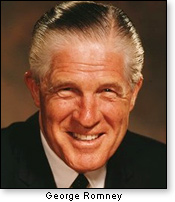 There's a natural reverence for Mitt in Mormondom. It stems in part from his "Romney" name — which is held in high esteem due to the respect accorded former Counselor in the First Presidency Marion G. Romney, a relative; and George Romney, Mitt's dad, the charismatic American Motors chairman who served three terms as governor of Michigan and ran for president in 1968.
There's a natural reverence for Mitt in Mormondom. It stems in part from his "Romney" name — which is held in high esteem due to the respect accorded former Counselor in the First Presidency Marion G. Romney, a relative; and George Romney, Mitt's dad, the charismatic American Motors chairman who served three terms as governor of Michigan and ran for president in 1968.
In politically-moderate LDS culture, George Romney was a virtual icon among Mormons. Nationally, he enjoyed a similar following from being frequently in the public eye with his memorable Rambler ads, maverick political causes, and exposure as governor of Michigan. When the race for the 1968 Republican presidential nomination began, initial polls showed him leading all other hopefuls — as well as the sitting president, Democrat Lyndon Johnson. In time, however, Richard Nixon — Romney's chief competitor — overtook him in the polls, and Romney dropped precipitously after his announced opposition to the Vietnam War. But his stature among Mormons remained high — especially after Nixon appointed him Secretary of Housing and Urban Development, a position Romney held throughout Nixon's first term.
As the privileged, promising son of a popular figure in Mormon culture, Mitt himself eventually graduated from Harvard with an MBA and a law degree, then made his own personal fortune as a founding partner in Bain Capital — an investment firm known for its leveraged buyouts of other companies — before rescuing the scandal-plagued Salt Lake Winter Olympics in 2002, and parleying that opportunity into a successful run for governor of Massachusetts.
It's thus logical that Mormons as a people would look to Mitt to succeed where his father failed: in presidential politics.
But there's more to Mormons' deep cultural support for Mitt's candidacy for president than his personal appeal. There's an undoctrinal tradition among the membership that the LDS church is destined to "fill the whole earth" as an institution and a culture — and the prospect of a Mitt Romney presidency sends Mormons into fantasies about the fulfillment of this expectation.
Let's take a look at that tradition.
Daniel's interpretation of the king's dream
Mormons generally interpret a familiar story in the Book of Daniel as foretelling the power and influence of the LDS church in the world's "end times."
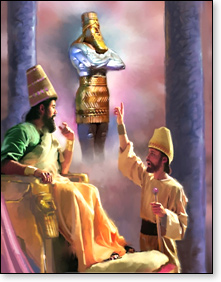 The account describes a dream of Babylon's King Nebuchadnezzar, by which Daniel interprets "what shall be in the latter days" (Dan. 2:28).
The account describes a dream of Babylon's King Nebuchadnezzar, by which Daniel interprets "what shall be in the latter days" (Dan. 2:28).
The dream centers in a "great image" — representing the kingdoms of the world — whose "head was of fine gold, his breast and his arms of silver, his belly and his thighs of brass, His legs of iron, his feet part of iron and part of clay" (verses 31-33).
In the dream, "a stone was cut out without hands, which smote the image upon his feet that were of iron and clay, and brake them to pieces...and the wind carried them away, that no place was found for them: and the stone that smote the image became a great mountain, and filled the whole earth" (verses 34-35, emphasis added).
That was the dream. Daniel adds words of interpretation that reveal the head is Nebuchadnezzar's kingdom, and the other body parts represent other kingdoms that will rise up in succession and rule the earth, then fall from power. He then says,
"Thy kingdom come"
Mormons believe the "kingdom of God" referred to in these passages is none other than the Church of Jesus Christ of Latter-day Saints. They base this conclusion on several passages in the LDS canon that appear to equate the church with the kingdom of God spoken of by Daniel.
Throughout the Doctrine & Covenants, the LDS church is identified as the kingdom of God — at least in ways potential and conditional, if not literal. (See, for instance, D&C 84:54-59.)
As a result, Mormon culture is immersed in a "manifest destiny" vision of its purpose that centers in spreading the church across the length and breadth of the earth in preparation for the end of the world.
Of course, the term "kingdom of God" has many meanings in scripture (including LDS scripture).
In the Lord's prayer, Jesus admonished his disciples to petition God thus: "Thy kingdom come. Thy will be done in earth, as it is in heaven" (Matt. 6:10). This well-known verse appears to equate God's kingdom with those who do His will on earth, likening them to the righteous in heaven.
As is also well known, Jesus taught, "My kingdom is not of this world" (John 18:36), and "The kingdom of God is within you" (Luke 17:21). Such verses suggest that God's true kingdom is not an earthly corporate entity, institution, or religious empire in the final analysis, but those individuals who are truly converted to Him, as a result of submission of their hearts to Him and willingness to put their trust solely in Him — in other words, those who've "come unto Christ" and genuinely been "reborn" — as taught in both the New Testament and the LDS canon.
We might add mention of Christ's familiar words in Matt. 6:33.
After assuring his listeners that God will provide their every need if they have sufficient faith in Him, Jesus says, "But seek ye first the kingdom of God, and his righteousness; and all these things shall be added unto you." It's fair to say that God's kingdom, in this context — consistent with similar passages — is those individuals who are truly righteous, in accordance with the clear standards of God's Word.
(For a discussion of this perspective, see our previous piece "What God says about Mormons.")
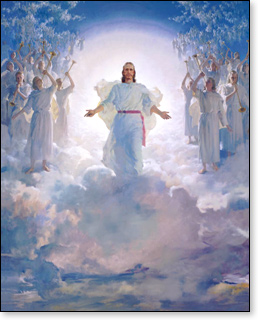 The inward, rather than outward, personal nature of God's kingdom is found throughout scripture — reflecting Jesus' emphasis on the inner man and woman — unlike the measurable systems of the world, with their powerful, tangible influence over human thought and behavior (see Luke 17:20).
The inward, rather than outward, personal nature of God's kingdom is found throughout scripture — reflecting Jesus' emphasis on the inner man and woman — unlike the measurable systems of the world, with their powerful, tangible influence over human thought and behavior (see Luke 17:20).
Does this mean God doesn't have in mind the establishment of a religious-political kingdom — led by Christ Himself — that will replace all earthly kingdoms, perhaps including those professing to be His disciples but feigning discipleship (see Matt. 7:21-29, D&C 112:24-26, and D&C 45:56-57)?
If He does, Mormons need to concede that it is the saving gospel of Jesus Christ — not a powerful institution or corporate entity controlled by men — that will ultimately "break down" the kingdoms of the world and usher in Christ's reign, as the LDS canon plainly teaches in D&C 65:2:
Constitution to "hang by a thread"
Our examination of Mormon "manifest destiny" would be incomplete without at least brief mention of the LDS cultural notion that "Mormons are destined to save the Constitution."
In Mormon lore, there is a tradition originating from statements by many LDS church leaders (statements not found in the church's canon) that the "U.S. Constitution will hang by a thread" and the "elders" of the church will "rise up and save it."
The notion has wide acceptance in the church.
The idea that the United States will ultimately teeter on the brink of collapse during the world's "end times," of course, is nothing new to informed Christian observers — in view of the cultural and political trends that have pushed our nation increasingly in that direction for over a century.
Many, if not most, conservatives agree we're fast approaching such a calamity — and they believe another four years of Barack Obama's divisive leadership would all but seal our fate.
But the idea that members of the Mormon church will be the vehicle for saving the Constitution would find little currency among non-Mormons.
Nonetheless, most Mormons are familiar with the above prediction, and appear to take it seriously. To such church members, Mitt offers their best hope yet of fulfilling this undoctrinal prophecy.
"Mitt's the man"
Mormons have everything they need in Mitt. They aren't particularly bothered, therefore, by his positions, or his record — and in fact, they don't seem inclined to look seriously into such things, since they plan to vote for Mitt anyway, for the reasons we've suggested.
And what if Mitt wins? What will a Romney presidency be like, and how will that help Mormons?
 If Mitt wins the presidency — an unlikely prospect, suggests WorldNetDaily CEO Joe Farah in his persuasive piece "Why Romney can't win" — America will remain permanently enslaved by the expanding chains of Obamacare; abortions will continue at current rates (or with only token respite); big government — and big-scale corporate welfare — will continue inexorably to multiply, with no relief for future generations of taxpayers; activist judges will find little resistance from the man in the Oval Office; the war on traditional marriage will be all but lost; America's moral fiber will continue to erode for lack of strong, principled leadership; and America will be unprepared for the calamities sure to come as part of God's judgments for increasingly turning our back on Him.
If Mitt wins the presidency — an unlikely prospect, suggests WorldNetDaily CEO Joe Farah in his persuasive piece "Why Romney can't win" — America will remain permanently enslaved by the expanding chains of Obamacare; abortions will continue at current rates (or with only token respite); big government — and big-scale corporate welfare — will continue inexorably to multiply, with no relief for future generations of taxpayers; activist judges will find little resistance from the man in the Oval Office; the war on traditional marriage will be all but lost; America's moral fiber will continue to erode for lack of strong, principled leadership; and America will be unprepared for the calamities sure to come as part of God's judgments for increasingly turning our back on Him.
Mitt has shown he hasn't the moral commitment, courage, or wisdom to lead us back to God or to sane public policy. With Mitt, we get no reining in of the evils that are destroying our country from within.
And Mormons? They'll get what they want more than anything else this election: to become "mainstreamed" into American society.
They'll be an even bigger social and cultural influence than ever — leading our nation away from serious commitment to Christian ideals and increasingly toward the "New Age" goofiness and "blind-leading-the-blind" cultishness embodied in the church's most prominent member, Mitt Romney.
Expect the church's culture itself to become even more relativistic and pragmatic than ever — in ways contrary to sound biblical doctrine (see 2 Tim. 4:2-5) — as its numbers dramatically multiply in the spirit of "Mormon manifest destiny."
Above all, expect the Mormon hierarchy to exert considerable behind-the-scenes power in American politics, as it does in Utah government. Mitt is a "yes man" — and while he will pretend to think and act for himself,* he will try to accommodate the wishes and priorities of the global-minded "Brethren."
March 22, 2012
 One of the curious things about Mitt Romney's 2012 presidential bid is the near-unanimous support he enjoys among fellow Mormons.
One of the curious things about Mitt Romney's 2012 presidential bid is the near-unanimous support he enjoys among fellow Mormons.He won the Nevada, Idaho, Arizona, Wyoming, and Hawaii primaries in large part because Mormons form influential voting blocs in those states.
Among Mormons in Utah — headquarters of the LDS church — he's expected to draw somewhere near 90 percent of the Mormon vote in Utah's June primary, as he did earlier in neighboring Nevada and Arizona.
Mormons have been the core base of Mitt's campaign from the outset, backing him not just with their enthusiastic votes, but their activism — as avid donors, volunteers, grassroots organizers, and online defenders. It's a rare Mormon who doesn't want to see Mitt elected president.
A different story elsewhere
As might be expected, Mitt's unabashed support among Mormons contrasts sharply with grudging support for him outside Mormon population centers.
 Beyond Mormon-dominated regions (see graphic), Mitt's backers are known to be lukewarm — voting for Mitt almost solely because they believe unsupportable claims "he has the best chance of beating Obama." Impressed that he's been out in front from the beginning this election cycle — largely the result of his establishment connections — they're swayed by his big money advantage, savvy professional organization, and aggressive campaign strategy, which has centered in successful attack ads against opponents, a tactic controversial among grassroots conservatives.
Beyond Mormon-dominated regions (see graphic), Mitt's backers are known to be lukewarm — voting for Mitt almost solely because they believe unsupportable claims "he has the best chance of beating Obama." Impressed that he's been out in front from the beginning this election cycle — largely the result of his establishment connections — they're swayed by his big money advantage, savvy professional organization, and aggressive campaign strategy, which has centered in successful attack ads against opponents, a tactic controversial among grassroots conservatives.Seemingly oblivious to the fact that Mitt's appeal tends to be regional; that he's barely eked out wins over chief competitor Rick Santorum in "test states" like Michigan and Ohio after vastly outspending him; that he's lost by landslides in many Republican states; and that many of his wins have been in Democrat states not likely to go Republican in the fall, Mitt's reluctant supporters have nonetheless feigned enthusiasm and given him a nod.
NewsMax.com founder Chris Ruddy, noting such facts, writes,
-
Romney has almost all the money, all the big endorsements from the Washington and New York insiders, and a well-oiled campaign machine, and yet he's being beaten by Rick Santorum who has a clipboard and whistle, and by Newt Gingrich who has a podium.
What's the message here? A supermajority of the Republican party — about 65 percent at this moment — either don't want Mitt Romney or are not comfortable with him as their nominee.
The leaders who make up the conservative movement across the nation consistently tell me the same thing: Mitt talks a conservative game, but he has yet to walk it.
The truth is that his policy advisers and campaign staff are filled with moderates who are out of step with the base of the Republican Party.
As a "cultural Mormon," Mitt thus has much in common with other LDS members, the vast majority of whom, we might add, are Republican. But that doesn't explain why — in the diverse world of politics — he enjoys almost unanimous support within Mormon culture.
Why such seemingly-reflexive support, as though backing Mitt were a "given" among U.S. Mormons?
Is anybody home?
We might be tempted to chalk up Mormons' virtually universal support for Mitt to "cultural pride" — the idea that "he's one of us, so of course we support him."
That would help explain the natural inclination of Mormons to go for Mitt, but not the extent of that inclination, which runs far and deep. Chances are (believe me, I've encountered it repeatedly), if you speak critically of Mitt with Mormon acquaintances, you're likely to get a highly emotional (if uninformed) rebuke.
The deeply-held passion for Mitt appears to outweigh objective analysis within the culture.
So much so that Mormons are willing to set aside Mitt's immense negatives and defend him single-mindedly in the face of legitimate questions and concerns. Among Mitt's negatives that could be cited are the following facts that trouble moral conservatives:
 Mitt's pro-choice history. For years, Mitt defied official LDS church teachings and policy and issued unequivocal statements in the political arena defending "a woman's right to choose abortion."
Mitt's pro-choice history. For years, Mitt defied official LDS church teachings and policy and issued unequivocal statements in the political arena defending "a woman's right to choose abortion."- In his U.S. Senate debate with Ted Kennedy in 1994, he said: "I believe that abortion should be safe and legal in this country. I have since the time that my mom took that position when she ran in 1970 as a U.S. Senate candidate. I believe that since Roe v. Wade has been the law for 20 years, that we should sustain and support it. And I sustain and support that law and the right of a woman to make that choice." (Video)
- Mitt reiterated his support for abortion in 2002 during his campaign for governor of Massachusetts — publicly declaring, "I will preserve and protect a woman's right to choose and am devoted and dedicated to honoring my word in that regard. I will not change any provisions of Massachusetts' pro-choice laws."
- In that 2002 campaign, he also said,
"My position has been the same throughout my political career. And it goes back to the days of 1970. There was a woman who was running for political office, U.S. Senate. She took a very bold and courageous stand in 1970...that a woman should have the right to make her own choice as to whether or not to have an abortion. Her name was Lenore Romney. She was my mom. Even though she lost, she established a record of courage in that regard. She had very strong personal beliefs about what decision she would make for herself and her family if offered to make that choice. But she also made it clear that she thought a woman should have her own right to choose and believed in the separation of church and state. I have held that view consistently."
- The researcher, Dr. Douglas Melton, has disputed the substance of Mitt's claimed "epiphany." According to a WorldNetDaily source, "Romney claims that Melton stunned him by casually referring to killing embryos.... But Dr. Melton was astounded to hear about this and quickly informed the media that regarding the conversation in question, 'We didn't discuss killing or anything related to it.'"
- And a detailed analysis of Mitt's abortion record points out Mitt has not advocated putting a stop to existing pro-abortion laws following his reported pro-life conversion — something anyone who is genuinely pro-life would naturally choose to do. Says the writer:
"Romney's conversion...wasn't from choice to life. It was from one empty word to another. To any real pro-lifer, 'pro-life' meant seeking legal protection for the unborn. If you said you were 'personally pro-life' but would preserve other people's right to choose abortion [as Romney continued to do as governor], that meant you were pro-choice."
The author concluded — after exhaustively examining Mitt's words and actions following his "conversion": "He was looking to change his identity, not his policies."
- Similarly, American Family Association spokesman Bryan Fischer says, "[Romney] knew he could not win the GOP nomination running on a pro-death platform, so he magically discovered new-found pro-life convictions. There is little question in my mind that Gov. Romney's conversion on the pro-life issue was one of convenience rather than conviction. The embryonic stem cell discovery was just a handy fig leaf to give his change of position some plausibility."
- In view of Mitt's unpersuasive claim that he is now "pro-life," moral conservatives have valid reason to question his sincerity, seeing expediency written all over his purported change of heart.
 Mitt's hand in establishing same-sex marriage in Massachusetts. Unbeknownst to most Americans outside evangelical circles (thanks largely to suppression of the story by the liberal media), Mitt single-handedly instituted same-sex marriage in Massachusetts when he was governor.
Mitt's hand in establishing same-sex marriage in Massachusetts. Unbeknownst to most Americans outside evangelical circles (thanks largely to suppression of the story by the liberal media), Mitt single-handedly instituted same-sex marriage in Massachusetts when he was governor.That's no typo — or exaggeration. The public record proves this shocking claim to be indisputable, setting Mitt directly at odds with the LDS church's well-publicized activism in behalf of Proposition 8 in California a few years afterward.
- According to verifiable facts, when the Massachusetts Supreme Judicial Court ruled in Nov. 2003 that the state's marriage law was unconstitutional because it didn't allow for same-sex marriages, the court gave the Legislature 180 days to "take such action as it may deem appropriate in view of this decision" — implicitly asking for a new marriage statute. (Note that under express provisions of the Massachusetts constitution, the court could only recommend — not order — such action.)
The Legislature deemed it appropriate to do nothing, and left the one man/one woman marriage law unchanged, as it remains to this day. Incredibly, when the court's deadline came, Gov. Romney — with no requirement from the court to do so — took it upon himself to order the issuance of marriage licenses to same-sex couples in violation of state law, an action without equal in our nation's history. In taking this action, he introduced gay marriage to the U.S., setting a precedent for other states.
Mitt's justification? He claims he had "no choice." Of course, all he needed to do was do nothing — as the Legislature chose to do. He wasn't even a direct party to the controversy, but injected himself into it of his own initiative. With an unlawful executive order, he changed the very nature of marriage in our country all by himself, and he alone bears the responsibility for such singular foolishness.
- When he ran against Mitt Romney in the 2008 primaries, Alan Keyes issued a public statement condemning Mitt's actions as "among the most socially-damaging actions by a chief executive in our nation's history." Noting that "The appropriate course of action for Romney was to do nothing," Keyes said: "As governor, he created, in essence, his own same-sex marriage rule and then enforced it — reportedly threatening local clerks with dismissal if they refused to comply with his executive order."
"The failure by Romney to 'say no' to corrupt activist judges in a critical controversy over 'separation of powers,' and his willingness to take unwarranted steps that exceeded his lawful authority, reveal the kind of chief executive he would be if elected president," Keyes added.
Keyes' press release was picked up by WorldNetDaily, which ran a prominent feature about it at the top of its website for a full day. The WND article was widely disseminated among evangelical Christians.
- It's fair to say that those who endorse Mitt Romney's bid for the Presidency of the United States therefore assent to his single most important action as governor of Massachusetts: his indefensible imposition of same-sex marriage in our country — which he undertook in clear defiance not only of the laws of Massachusetts and the U.S., but of the laws of God.
There's no way to spin things otherwise, in view of the facts.
According to one report,
-
"The White House wanted to lean a lot on what we'd done in Massachusetts," said Jon Gruber, an MIT economist who advised the Romney administration on health care and who attended five meetings at the Obama White House in 2009, including [a] meeting with the President. "They really wanted to know how we can take that same approach we used in Massachusetts and turn that into a national model."
 But Mitt has maintained throughout the 2012 election that he never personally endorsed the so-called "individual mandate" that is the heart of Romneycare for use at the national level. Although he has said the intrusive mandate was a natural fit for liberal states like Massachusetts, he's claimed he opposed the mandate's adoption by the federal government as a universal requirement for all Americans.
But Mitt has maintained throughout the 2012 election that he never personally endorsed the so-called "individual mandate" that is the heart of Romneycare for use at the national level. Although he has said the intrusive mandate was a natural fit for liberal states like Massachusetts, he's claimed he opposed the mandate's adoption by the federal government as a universal requirement for all Americans.Now we learn he deliberately misled the American public:
- In early March, numerous national media outlets published revelations that Mitt was untruthful in his claims he never pushed Romneycare's individual mandate for use at the federal level. It turns out that he publicly advocated such a plan in a 2009 op-ed in USA Today.
Among the outlets publicizing the story was Glenn Beck's The Blaze. Under the title "Romney slammed by conservatives for pushing federal health mandate in 2009 op-ed," the article said,
"Republican presidential candidate Mitt Romney has faced criticism throughout the campaign for the similarities between [his healthcare plan in Massachusetts] and the plan crafted by President Obama.... Romney [says] that he never advocated for his plan to be adopted on a national level.
"Conservative commentators have now pounced on Romney after it was revealed late Friday that he penned a July 2009 op-ed in USA Today encouraging President Obama to adopt an individual mandate requiring Americans to buy health insurance, a provision near universally despised by Republicans...."
- Concerning the controversy, National Review Online's Andrew McCarthy wrote,
"This seems very significant. A number of us have expressed concerns that Romney cannot effectively confront Obama on Obamacare, the wrongheadedness and unpopularity of which make it the Republicans' most crucial issue in the campaign. In response, Romney posits that he is a Tenth Amendment guy who saw what he was doing as right for his state, and perhaps other states, but certainly not a national model to be adopted at the federal level. For what it's worth, I've contended that those claims are utterly unpersuasive (some are downright frivolous).
"But that hardly matters now. The op-ed demonstrates that Mitt regarded Romneycare precisely as a model the federal government ought to adopt, and that the 'tax penalties' by which Massachusetts's individual mandate are enforced were a good fit for Congress and the Obama administration to impose by federal law."
- Romney has been accused of outright lying in the matter. One of many commentators to point out the obvious, MSNBC's Joe Scarborough, told his audience,
"What does it say about a candidate...who wrote an op-ed in 2009 saying... please apply what we did in Massachusetts nationally on an individual mandate, and then goes on the campaign trail...and just lies?"
"He lied yesterday [about the matter]," Scarborough said. "It's on videotape. What are conservatives to think about that?"
Scarborough's co-host Mika Brzezinski added, "Not only did he lie, but his people — they seem to be constantly letting him down, they shouldn't have let him do it." She continued, "And then, take it to the next level, does he think people are stupid? Because that's insulting."
- RedState's Erick Erickson underscored the significance of Mitt's duplicity in these words: "Friends, if Mitt Romney is the nominee, we will be unable to fight Obama on an issue that 60% of Americans agree with us on."
 Other flip-flops and deceit
Other flip-flops and deceitThere are many other troubling words and actions that can be cited that raise serious questions about Mitt's perceived "lack of a moral core." Massachusetts pro-life writer Amy Contrada, in her heavily-referenced book Mitt Romney's Deception, catalogs Mitt's extensive — and disturbing — record that reveals him to be not only less than truthful or trustworthy, but fundamentally liberal.
Mitt's claim that he is a "conservative" can readily be shown to be a carefully-crafted hoax on the voting public. At least, those familiar with Mitt's record would find no fault with that assessment.
It's voters who are blithely uninformed about Mitt Romney — and also about their God-given duty to objectively weigh all major candidates — who might be inclined to find fault with that view.
"Nothing to see here, move along"
Mitt's documented words and behavior — it's reasonable to conclude — disqualify him from serious consideration by conservatives for the Republican nomination. To be candid, no voter who possesses a God-centered, biblical moral compass could support such demonstrable duplicity, unbridled ambition, or stunning ineptitude.
To do so would require ignoring obvious issues of right and wrong — no matter the twisted polemics offered by those who see Mitt as "conservatives' only hope" of saving our country from the duplicity, unbridled ambition, and ineptitude of Barack Obama.
As pro-life leader Alan Keyes would say at the end of segments on his notable MSNBC-TV show: "Does that make sense?"
Why, then, is Mormon support for Mitt so vast and deep?
Besides the "Mitt's-one-of-us-so-of-course-we-support-him" mentality that might be expected among a controversial culture like Mormonism that yearns for acceptance, there are more substantial reasons for Mormons' nearly universal — and typically ill-informed — support for Mitt.
The most obvious is his pedigree. Not so obvious is a phenomenon I call "Mormon manifest destiny." Let's look at these two factors, then form some conclusions.
Born to rule
 There's a natural reverence for Mitt in Mormondom. It stems in part from his "Romney" name — which is held in high esteem due to the respect accorded former Counselor in the First Presidency Marion G. Romney, a relative; and George Romney, Mitt's dad, the charismatic American Motors chairman who served three terms as governor of Michigan and ran for president in 1968.
There's a natural reverence for Mitt in Mormondom. It stems in part from his "Romney" name — which is held in high esteem due to the respect accorded former Counselor in the First Presidency Marion G. Romney, a relative; and George Romney, Mitt's dad, the charismatic American Motors chairman who served three terms as governor of Michigan and ran for president in 1968.In politically-moderate LDS culture, George Romney was a virtual icon among Mormons. Nationally, he enjoyed a similar following from being frequently in the public eye with his memorable Rambler ads, maverick political causes, and exposure as governor of Michigan. When the race for the 1968 Republican presidential nomination began, initial polls showed him leading all other hopefuls — as well as the sitting president, Democrat Lyndon Johnson. In time, however, Richard Nixon — Romney's chief competitor — overtook him in the polls, and Romney dropped precipitously after his announced opposition to the Vietnam War. But his stature among Mormons remained high — especially after Nixon appointed him Secretary of Housing and Urban Development, a position Romney held throughout Nixon's first term.
As the privileged, promising son of a popular figure in Mormon culture, Mitt himself eventually graduated from Harvard with an MBA and a law degree, then made his own personal fortune as a founding partner in Bain Capital — an investment firm known for its leveraged buyouts of other companies — before rescuing the scandal-plagued Salt Lake Winter Olympics in 2002, and parleying that opportunity into a successful run for governor of Massachusetts.
It's thus logical that Mormons as a people would look to Mitt to succeed where his father failed: in presidential politics.
But there's more to Mormons' deep cultural support for Mitt's candidacy for president than his personal appeal. There's an undoctrinal tradition among the membership that the LDS church is destined to "fill the whole earth" as an institution and a culture — and the prospect of a Mitt Romney presidency sends Mormons into fantasies about the fulfillment of this expectation.
Let's take a look at that tradition.
Daniel's interpretation of the king's dream
Mormons generally interpret a familiar story in the Book of Daniel as foretelling the power and influence of the LDS church in the world's "end times."
 The account describes a dream of Babylon's King Nebuchadnezzar, by which Daniel interprets "what shall be in the latter days" (Dan. 2:28).
The account describes a dream of Babylon's King Nebuchadnezzar, by which Daniel interprets "what shall be in the latter days" (Dan. 2:28).The dream centers in a "great image" — representing the kingdoms of the world — whose "head was of fine gold, his breast and his arms of silver, his belly and his thighs of brass, His legs of iron, his feet part of iron and part of clay" (verses 31-33).
In the dream, "a stone was cut out without hands, which smote the image upon his feet that were of iron and clay, and brake them to pieces...and the wind carried them away, that no place was found for them: and the stone that smote the image became a great mountain, and filled the whole earth" (verses 34-35, emphasis added).
That was the dream. Daniel adds words of interpretation that reveal the head is Nebuchadnezzar's kingdom, and the other body parts represent other kingdoms that will rise up in succession and rule the earth, then fall from power. He then says,
-
And in the days of these kings shall the God of heaven set up a kingdom, which shall never be destroyed: and the kingdom shall not be left to other people, but it shall break in pieces and consume all these kingdoms, and it shall stand for ever. (verse 44, emphasis added)
"Thy kingdom come"
Mormons believe the "kingdom of God" referred to in these passages is none other than the Church of Jesus Christ of Latter-day Saints. They base this conclusion on several passages in the LDS canon that appear to equate the church with the kingdom of God spoken of by Daniel.
Throughout the Doctrine & Covenants, the LDS church is identified as the kingdom of God — at least in ways potential and conditional, if not literal. (See, for instance, D&C 84:54-59.)
As a result, Mormon culture is immersed in a "manifest destiny" vision of its purpose that centers in spreading the church across the length and breadth of the earth in preparation for the end of the world.
Of course, the term "kingdom of God" has many meanings in scripture (including LDS scripture).
In the Lord's prayer, Jesus admonished his disciples to petition God thus: "Thy kingdom come. Thy will be done in earth, as it is in heaven" (Matt. 6:10). This well-known verse appears to equate God's kingdom with those who do His will on earth, likening them to the righteous in heaven.
As is also well known, Jesus taught, "My kingdom is not of this world" (John 18:36), and "The kingdom of God is within you" (Luke 17:21). Such verses suggest that God's true kingdom is not an earthly corporate entity, institution, or religious empire in the final analysis, but those individuals who are truly converted to Him, as a result of submission of their hearts to Him and willingness to put their trust solely in Him — in other words, those who've "come unto Christ" and genuinely been "reborn" — as taught in both the New Testament and the LDS canon.
We might add mention of Christ's familiar words in Matt. 6:33.
After assuring his listeners that God will provide their every need if they have sufficient faith in Him, Jesus says, "But seek ye first the kingdom of God, and his righteousness; and all these things shall be added unto you." It's fair to say that God's kingdom, in this context — consistent with similar passages — is those individuals who are truly righteous, in accordance with the clear standards of God's Word.
(For a discussion of this perspective, see our previous piece "What God says about Mormons.")
 The inward, rather than outward, personal nature of God's kingdom is found throughout scripture — reflecting Jesus' emphasis on the inner man and woman — unlike the measurable systems of the world, with their powerful, tangible influence over human thought and behavior (see Luke 17:20).
The inward, rather than outward, personal nature of God's kingdom is found throughout scripture — reflecting Jesus' emphasis on the inner man and woman — unlike the measurable systems of the world, with their powerful, tangible influence over human thought and behavior (see Luke 17:20).Does this mean God doesn't have in mind the establishment of a religious-political kingdom — led by Christ Himself — that will replace all earthly kingdoms, perhaps including those professing to be His disciples but feigning discipleship (see Matt. 7:21-29, D&C 112:24-26, and D&C 45:56-57)?
If He does, Mormons need to concede that it is the saving gospel of Jesus Christ — not a powerful institution or corporate entity controlled by men — that will ultimately "break down" the kingdoms of the world and usher in Christ's reign, as the LDS canon plainly teaches in D&C 65:2:
-
The keys of the kingdom of God are committed unto man on the earth, and from thence shall the gospel roll forth unto the ends of the earth, as the stone which is cut out of the mountain without hands shall roll forth, until it has filled the whole earth. (emphasis added)
Constitution to "hang by a thread"
Our examination of Mormon "manifest destiny" would be incomplete without at least brief mention of the LDS cultural notion that "Mormons are destined to save the Constitution."
In Mormon lore, there is a tradition originating from statements by many LDS church leaders (statements not found in the church's canon) that the "U.S. Constitution will hang by a thread" and the "elders" of the church will "rise up and save it."
The notion has wide acceptance in the church.
The idea that the United States will ultimately teeter on the brink of collapse during the world's "end times," of course, is nothing new to informed Christian observers — in view of the cultural and political trends that have pushed our nation increasingly in that direction for over a century.
Many, if not most, conservatives agree we're fast approaching such a calamity — and they believe another four years of Barack Obama's divisive leadership would all but seal our fate.
But the idea that members of the Mormon church will be the vehicle for saving the Constitution would find little currency among non-Mormons.
Nonetheless, most Mormons are familiar with the above prediction, and appear to take it seriously. To such church members, Mitt offers their best hope yet of fulfilling this undoctrinal prophecy.
"Mitt's the man"
Mormons have everything they need in Mitt. They aren't particularly bothered, therefore, by his positions, or his record — and in fact, they don't seem inclined to look seriously into such things, since they plan to vote for Mitt anyway, for the reasons we've suggested.
And what if Mitt wins? What will a Romney presidency be like, and how will that help Mormons?
 If Mitt wins the presidency — an unlikely prospect, suggests WorldNetDaily CEO Joe Farah in his persuasive piece "Why Romney can't win" — America will remain permanently enslaved by the expanding chains of Obamacare; abortions will continue at current rates (or with only token respite); big government — and big-scale corporate welfare — will continue inexorably to multiply, with no relief for future generations of taxpayers; activist judges will find little resistance from the man in the Oval Office; the war on traditional marriage will be all but lost; America's moral fiber will continue to erode for lack of strong, principled leadership; and America will be unprepared for the calamities sure to come as part of God's judgments for increasingly turning our back on Him.
If Mitt wins the presidency — an unlikely prospect, suggests WorldNetDaily CEO Joe Farah in his persuasive piece "Why Romney can't win" — America will remain permanently enslaved by the expanding chains of Obamacare; abortions will continue at current rates (or with only token respite); big government — and big-scale corporate welfare — will continue inexorably to multiply, with no relief for future generations of taxpayers; activist judges will find little resistance from the man in the Oval Office; the war on traditional marriage will be all but lost; America's moral fiber will continue to erode for lack of strong, principled leadership; and America will be unprepared for the calamities sure to come as part of God's judgments for increasingly turning our back on Him.Mitt has shown he hasn't the moral commitment, courage, or wisdom to lead us back to God or to sane public policy. With Mitt, we get no reining in of the evils that are destroying our country from within.
And Mormons? They'll get what they want more than anything else this election: to become "mainstreamed" into American society.
They'll be an even bigger social and cultural influence than ever — leading our nation away from serious commitment to Christian ideals and increasingly toward the "New Age" goofiness and "blind-leading-the-blind" cultishness embodied in the church's most prominent member, Mitt Romney.
Expect the church's culture itself to become even more relativistic and pragmatic than ever — in ways contrary to sound biblical doctrine (see 2 Tim. 4:2-5) — as its numbers dramatically multiply in the spirit of "Mormon manifest destiny."
Above all, expect the Mormon hierarchy to exert considerable behind-the-scenes power in American politics, as it does in Utah government. Mitt is a "yes man" — and while he will pretend to think and act for himself,* he will try to accommodate the wishes and priorities of the global-minded "Brethren."
*For a glimpse into the way Mitt and Mormon leaders have evidently collaborated in politics in the past, so we know what to expect in the future, consider the following excerpt from William Saletan's article "The Conversion."
It describes how Romney obtained the approval of the church's highest leadership to profess to be pro-choice in his 1994 U.S. Senate run in Massachusetts:
It describes how Romney obtained the approval of the church's highest leadership to profess to be pro-choice in his 1994 U.S. Senate run in Massachusetts:
-
Romney [told the Brethren that, based on a poll,] if he didn't frame his position as pro-choice, he'd lose. Many of the church leaders were unhappy with Romney's formulation. But if they wanted him in the Senate, this was the best they were going to get.
[Upon returning to Boston,] Romney talked [with] Judy Dushku, a Mormon feminist, [who later said]:
"I went to his office and I congratulated him on taking a pro-choice position. And his response was — Well they told me in Salt Lake City I could take this position, and in fact I probably had to in order to win in a liberal state like Massachusetts. ...I know that I have to take that position."
A close look at Mitt's Mormonism
God's 'moral imperative': a voter's guide
Mitt's 'McCain impression'
Mitt's millstone dilemma
What God says about Mormons
Understanding Mitt's Mormon culture
Who is Mitt Romney?
Download an advance copy of A Mormon Story
Highlights of A Mormon Story
Background about A Mormon Story
© Stephen StoneGod's 'moral imperative': a voter's guide
Mitt's 'McCain impression'
Mitt's millstone dilemma
What God says about Mormons
Understanding Mitt's Mormon culture
Who is Mitt Romney?
Download an advance copy of A Mormon Story
Highlights of A Mormon Story
Background about A Mormon Story
